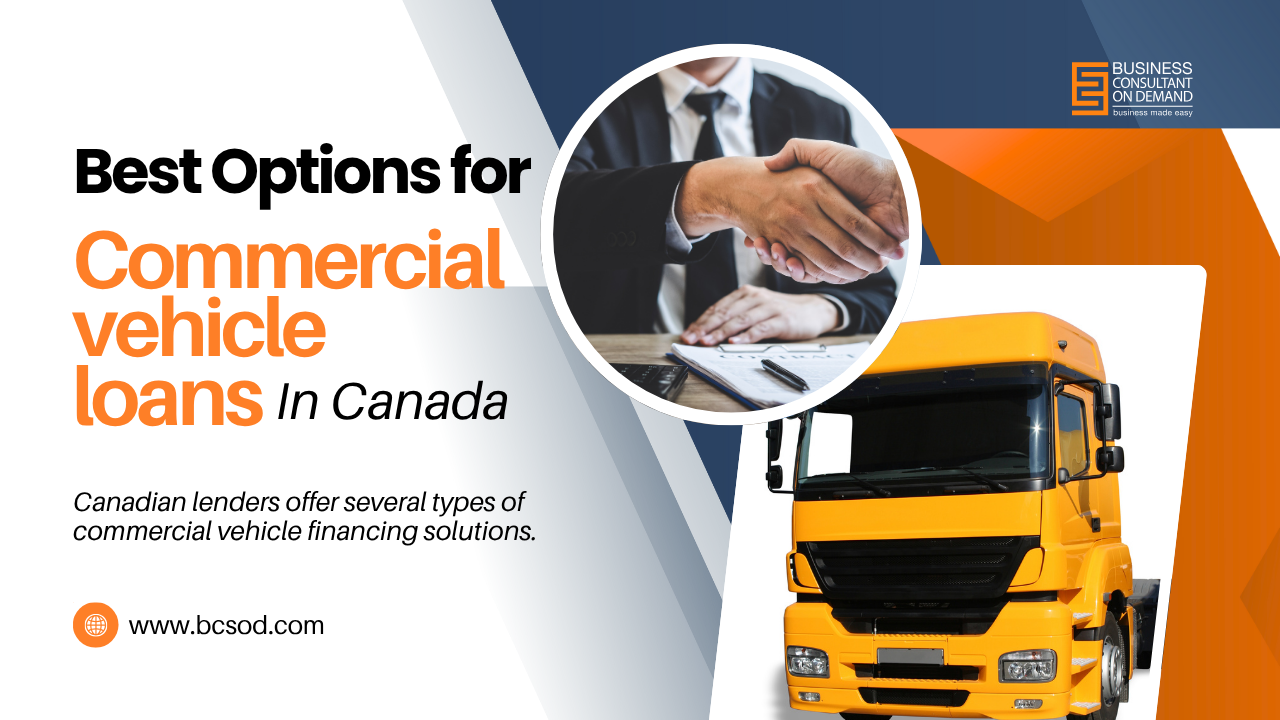The Best Options for Commercial Vehicle Loans in Canada
In Canada’s competitive and ever-expanding economy, efficient transportation is essential for many businesses—from logistics and construction to food delivery and mobile services. Whether you’re a small business owner needing a single van or a large enterprise expanding your fleet, commercial vehicle loans in Canada can provide the capital necessary to move your operations forward.
This article will guide you through the fundamentals of commercial vehicle financing, the types of vehicles eligible, available loan options, qualification criteria, and best practices to secure funding with favorable terms.
What Are Commercial Vehicle Loans?
A commercial vehicle loan is a specialized form of financing designed to help businesses purchase vehicles used for work-related purposes. Unlike personal auto loans, these are tailored for business use and can be used to finance a wide range of vehicles, such as:
- Delivery vans
- Pickup trucks
- Semi-trucks and trailers
- Refrigerated transport vehicles
- Construction vehicles (dump trucks, cement mixers, etc.)
- Company cars used by sales teams or executives
In Canada, businesses of all sizes—sole proprietors, partnerships, corporations—can access commercial vehicle loans, making them an essential tool for growth and operations.
Why Businesses in Canada Choose Commercial Vehicle Loans
Here are the top reasons why Canadian businesses turn to commercial vehicle financing:
1. Preserve Cash Flow
Instead of using large amounts of working capital to purchase vehicles outright, businesses can spread payments over time, preserving cash for other operational needs.
2. Tax Advantages
In Canada, the interest paid on commercial vehicle loans and depreciation of the vehicle may be tax-deductible (always confirm with your accountant).
3. Build Business Credit
Timely repayment of a commercial vehicle loan contributes positively to your business credit score, which can help when applying for future financing.
4. Upgrade Fleet Easily
With financing, businesses can afford newer, more fuel-efficient, and technologically advanced vehicles that may improve safety and reduce maintenance costs.
Types of Commercial Vehicle Financing Options in Canada
Canadian lenders offer several types of commercial vehicle financing solutions. Each option has its pros and cons depending on your business model and financial situation.
1. Traditional Commercial Vehicle Loan
These loans are provided by banks, credit unions, and specialized commercial lenders. You borrow a lump sum to purchase the vehicle and repay it over a fixed term with interest.
- Loan Term: Typically 1 to 7 years
- Interest Rates: Fixed or variable (typically 5% to 12%)
- Down Payment: Often 10–30%
2. Commercial Vehicle Leasing
Leasing allows you to use the vehicle without owning it. At the end of the lease, you can either return the vehicle, buy it, or lease a new one.
- Lower Monthly Payments than a loan
- Ideal for Short-Term Use or Constant Upgrades
- May offer buyout options at lease-end
3. Equipment Financing
Some lenders categorize commercial vehicles as “equipment,” particularly for construction or agricultural use. Equipment loans often come with tailored terms and competitive rates.
- Suitable for heavy-duty trucks, trailers, or construction vehicles
- May offer tax and accounting benefits
4. Government-Backed Loans and Grants
While not vehicle-specific, programs like the Commercial vehicle loans in Canada and Canada Small Business Financing Program (CSBFP) can sometimes be used for eligible vehicle purchases, and Easy access funds or especially if the vehicle is considered an asset for business use.
Eligibility Criteria for Commercial Vehicle Loans in Canada
Loan approval depends on several key factors:
1. Business Credit History
Lenders review your business credit score, past borrowing behavior, and debt-to-income ratio. A strong credit profile helps secure better terms.
2. Business Age and Revenue
Lenders prefer businesses that have been operational for at least 6–12 months and have consistent revenue. Startups may still qualify but may face higher rates or require a personal guarantee.
3. Vehicle Type and Condition
- New vehicles are easier to finance easy access funds and often qualify for better rates
- Used vehicles may still be eligible, but lenders often limit the age (e.g., less than 7 years old)
4. Down Payment and Collateral
Most lenders require a down payment, especially for high-value vehicles. The vehicle itself often acts as collateral, meaning it can be repossessed in case of loan default.
5. Personal Credit Score (for Small Businesses)
If your business is new or lacks credit history, lenders may evaluate your personal credit score as a secondary factor.
How to Apply for a Commercial Vehicle Loan in Canada
The application process varies by lender, but generally includes the following steps:
Step 1: Prepare Financial Documentation
Gather necessary documents, such as:
- Business registration documents
- Recent tax returns or financial statements
- Bank statements (3–6 months)
- Personal and/or business credit reports
- Proof of income or revenue
- Vehicle information (spec sheet, invoice, VIN)
Step 2: Compare Lenders and Terms
Get quotes from multiple lenders—banks, credit unions in Commercial vehicle loans in Canada and online financing platforms. Compare:
- Interest rates
- Loan terms
- Prepayment penalties
- Total cost of borrowing
- Insurance requirements
Step 3: Submit Application
Complete the application either online or in-person. Many fintech lenders offer same-day or 24-hour approvals.
Step 4: Vehicle Purchase and Disbursement
Once approved, funds are either transferred directly to the seller or reimbursed to you after purchase, depending on the lender’s process.
Top Canadian Lenders Offering Commercial Vehicle Loans
Some of the leading providers of commercial vehicle loans in Canada include:
- BMO Commercial Banking
- RBC Business Banking
- Scotiabank Equipment Finance
- TD Auto Finance
- CIBC Commercial Banking
- National Leasing (CWB Group)
- Fairstone
- iCapital, Loans Canada, and other online platforms
Always consult a financial advisor before committing to a loan agreement with , especially if you’re comparing leasing vs. financing.
Tips to Secure the Best Commercial vehicle loans in Canada
- Check Your Credit (Business & Personal): A higher score equals better terms.
- Negotiate the Price of the Vehicle: Just like a personal car, you can negotiate with the seller before applying for the loan.
- Avoid Unnecessary Add-Ons: Insurance, warranties, or maintenance plans may be bundled in—assess if they’re really needed.
- Understand the Total Cost of Borrowing: Don’t just focus on monthly payments. Consider interest rate, fees, and penalties.
- Maintain a Strong Cash Flow: Lenders assess your ability to make payments, so demonstrate financial health.
- Compare Fixed vs. Variable Rates: Depending on the market, fixed rates offer stability, while variable may provide savings.
Conclusion: Drive Your Business Forward with the Right Financing
Securing a commercial vehicle loan in Canada is more than just getting a set of wheels—it’s about enabling mobility, reliability, and professionalism for your business. Whether you’re transporting goods, providing on-site services, or building infrastructure, the right vehicle can enhance your brand and operational capacity.








